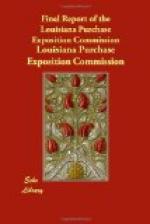During the long interim preceding the arrival of President Francis and those aiding him, those of the committee who had remained in the capital were untiring in their efforts to make friends for the bill, and as their cause was heartily indorsed by their respective Senators and many members of their State delegations, they became most hopeful of ultimate success.
The unceasing energy of the members of the legislative committee was admirably aided by the president of this board, who had been untiring in her efforts to make friends for the bill, and had used these efforts in a masterly manner. Her large acquaintance among, and knowledge of, men of affairs in Washington, and her clear statements as to the way in which this board had been created, and her convincing argument that the work of the board must of necessity be most inadequate and inefficient by reason of lack of funds, gained many advocates for the bill, and to her is due the credit for the success of the work which the committee was appointed to do. She was always at work, unresting, unhasting, and, although weary and worn with the interminable delay, neither she nor any member of the committee left any honorable means untried in order to secure what was so vitally necessary to the very existence of this board during the exposition.
As the result of the combined efforts some who had affected indifference became interested, and some who had previously stoutly declared unalterable opposition finally yielded, not only working and voting themselves in favor of the bill, but persuading others to do so. It was naturally a source of great satisfaction to the members of the legislative committee that the strongest and most influential men of both Houses gave recognition to the urgent claims which the board of lady managers had upon Congress. It was these men who insisted upon the incorporation of the specific clause providing for their $100,000 as an amendment in the loan bill. This was eventually done, and the amendment remained there until the passage of the bill, thus becoming a part of the law governing the Louisiana Purchase Exposition.
A brief description of the
manner in which the loan bill was
brought before Congress may
be of interest.
There is, in every session, what is called an urgency deficiency bill, the object of which is to take care of the different Interests which are likely to fail through inadequate appropriation. The opposition to including the item of the loan for the Exposition Company was found to be so powerful that it could not be inserted in the bill when it was sent to the House. This urgent deficiency bill passed the House and went to the Senate. There the loan amendment was inserted, and finally our amendment was added also. It passed the Senate and was then returned to the House in order that that body might pass upon the amendments which the Senate had added. In the meetings before




